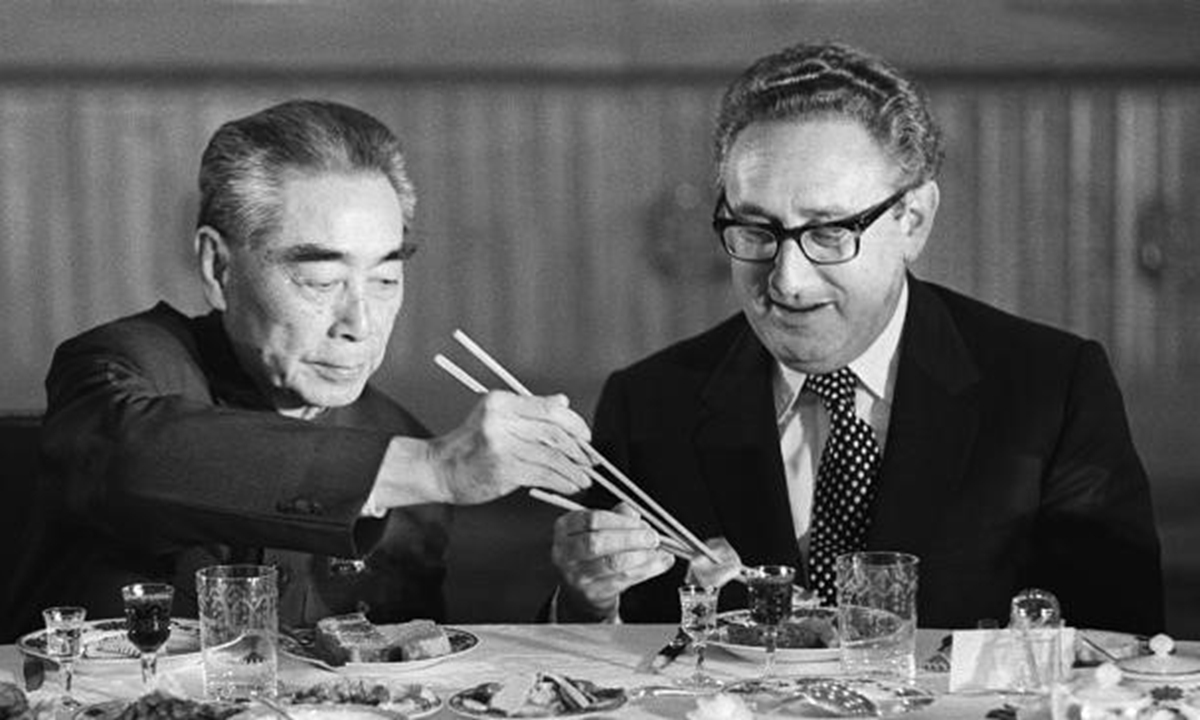




- BRNN
- BRI News
- BRNN News
- Database
Official Documents Polices and Regulations
Inter-government Documents International Cooperation BRI Countries
Business Guide Economic Data BRI Data
Trade
Investment Projects Latest projects
Cases - Content Pool
At 4:00 am, July 9, 1971, the Chaklala Airbase in Pakistan's capital was still enveloped in the darkness of night. A man wearing a black suit, a black hat and black glasses, walked toward a Boeing 707 with his entourage. Waiting for him on board was the Chinese reception team headed by Zhang Wenjin, Director-General of the Department of European and American Affairs of the Chinese Foreign Ministry, together with Wang Hairong, Tang Longbin and Tang Wensheng from the Protocol Department.
Once on board, the man in black took off his disguise and revealed his face. He was Dr. Henry Kissinger, then Assistant to the US President for National Security Affairs. He would soon become the first US government official to set foot on the Chinese territory after the founding of the People's Republic of China. His secret visit was code-named "Marco Polo" as it was much like Marco Polo's adventure to the mysterious oriental land in the 12th century. Both Chinese and American officials were on high alert in their very first meeting. The deed box held by the two American agents were chained to their wrists. The Chinese were in tunic suits and the Americans in dark suits. Neither side seemed to be ready to start a conversation. Finally, it was Kissinger, the veteran diplomat, that broke the ice. "I'm glad to meet Nancy Tang," said Kissinger, referring to Tang Wensheng on the Chinese side. Tang was born in New York, and Nancy was her English name. Kissinger joked that Tang could run for the president of the United States but he couldn't. That's because Kissinger was born in Germany while Tang was born in the United States. The US Constitution stipulates that to serve as president, one must be a natural born citizen of the United States. Kissinger's little joke worked, and the atmosphere in the cabin soon warmed up.
Still, the friendly atmosphere during the flight was not enough to let both sides drop guards. Because everyone knew that the meeting between Dr. Kissinger and Premier Zhou Enlai in the afternoon would determine the outcome of the trip. Despite his experience of teaching international relations at Harvard, he was still unsure of himself when meeting with Zhou. Instead of following his usual habit of improvisation, Kissinger kept reading his notes, while Zhou had not even a piece of paper before him. After listening patiently to Kissinger's lengthy statement, Zhou causally responded that the two sides could freely express their ideas and there was no need to read from scripts. Zhou, an outstanding diplomat, understood perfectly that diplomacy was about the balance between principles and flexibility. Joke aside, Zhou also used the opportunity to question the assertion that President Nixon made in the "five-power world" speech, which predicted that China would grow into a power in the world. Zhou assured Kissinger that China would never seek to be a superpower, even when it becomes strong. Kissinger wasn't sure how to respond, because he had no idea about this impromptu speech of Nixon. Noticing the awkwardness, Zhou gave a copy of Nixon's speech to every one on the American side, as he would never seek to gain an upper hand by taking advantage of the guests. Such a gesture won the respect of Kissinger. The meeting started at 4:00 pm and lasted till 11:30 pm at night.

Zhou Enlai and Henry Kissinger
The next day, after a tour of the Palace Museum and a taste of the Peking Roast Duck, Dr. Kissinger had his second meeting with Premier Zhou, and set the date for President Nixon's visit to China. After the meeting, Kissinger walked out with Zhou, opened the car door for him and protected Zhou from bumping into the door frame with his arm. After seeing Zhou off, Kissinger and his assistants talked and laughed out loud in the courtyard and the deed box that the agents tied to their wrists was left unattended in the room. All this stood in stark contrast to the nervousness before the meeting. On the noon of July 11, Dr. Kissinger left Beijing. Marshal Ye Jianying and the Chinese reception team bid him farewell at the airport. Recalling this experience, Dr. Kissinger said it was an honor to work with those excellent people on something that was never done before. President Nixon, who was anxiously waiting on the other side of the Pacific, soon received Kissinger's encrypted message "Eureka (triumph)."
Four days later, in a national address delivered at his hometown California, President Nixon delightedly read the announcement jointly drafted with China: Knowing that Nixon wanted to visit China, Zhou, on behalf of the Chinese government, had invited him to come to the country at an "appropriate date" before May 1972. Nixon had accepted the invitation "with pleasure."
The announcement stunned America and the whole world. The Nixon Shock, as the American newspapers called it, opened a new page in China-US relations and world politics.

Tel:86-10-65368972, 86-10-65369967